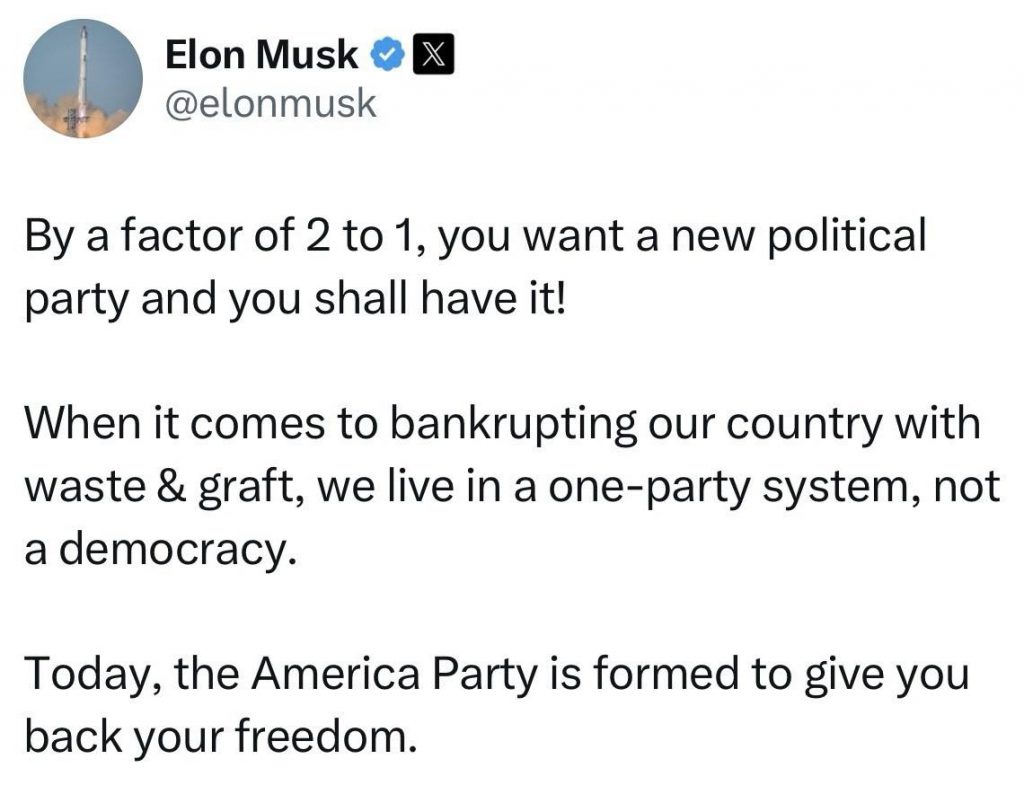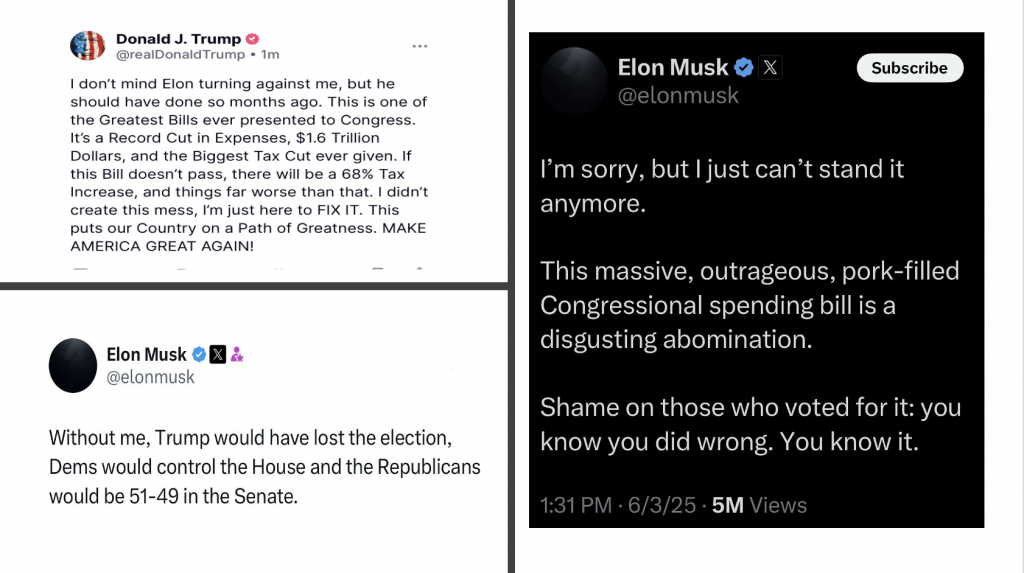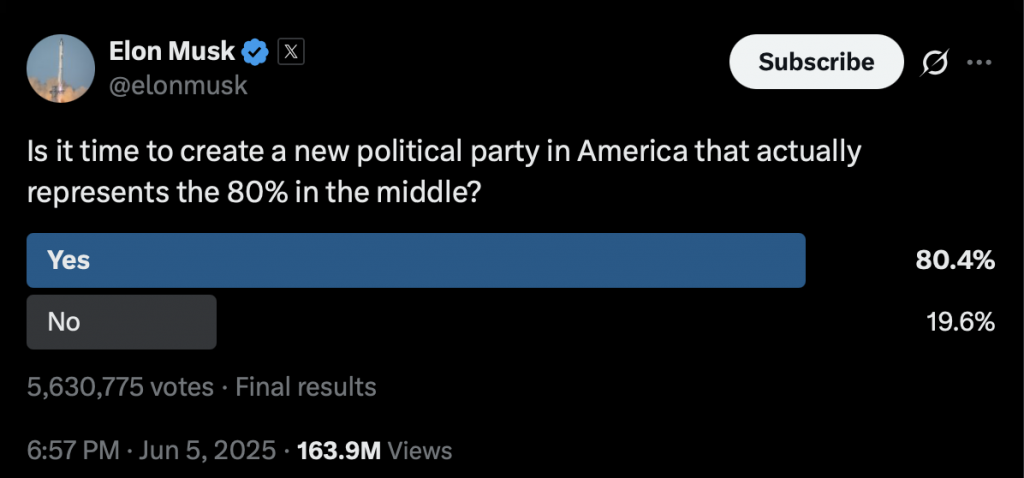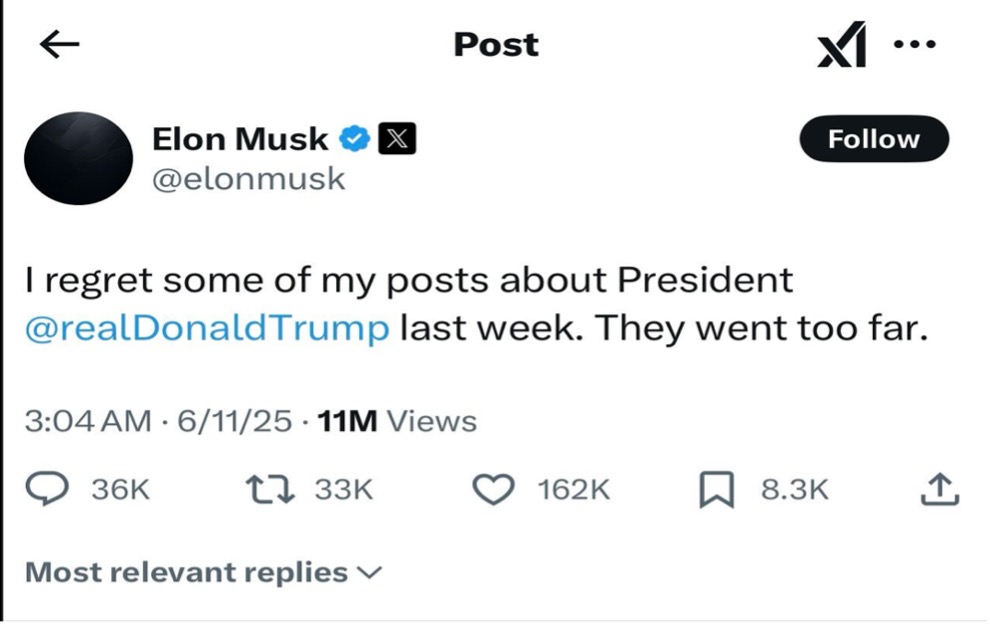The once steady alliance between Donald Trump and Elon Musk has now become a bitter feud. It has transformed what should be serious political discourse into a social media spectacle that perfectly encapsulates our current democratic crisis. Mimi Mihăilescu argues that American democracy is crumbling into a grotesque theatre where the world's most powerful men treat governance like a reality show
The Trump-Musk feud exemplifies a dangerous new model of governance. It is one that requires the complete subordination of democratic institutions to the mere spectacle of entertainment. The mechanics are straightforward: generate controversy, dominate media cycles, and use the attention to advance political objectives without democratic scrutiny.

On Saturday 5 July, Musk announced on X: 'Today, the America Party is formed to give you back your freedom'.
Trump responded by calling him a TRAIN WRECK.
Their squabble demonstrates how billionaire ego battles have replaced substantive policy discourse as the primary mechanism of political engagement.
This isn't political debate but a theatre for billionaires, performed on platforms they control. It operates through algorithmic amplification across social media, where engagement metrics reward conflict over consensus. Each inflammatory exchange generates millions of interactions, creating lucrative revenue streams.
The asymmetry is striking. Musk literally owns the stage (X) where much of this drama unfolds. Trump, meanwhile, broadcasts from his Truth Social echo chamber. Yet both command audiences that dwarf traditional media outlets, revealing how platform control has become the ultimate political weapon.
The Trump-Musk feud reveals how social media platforms have become instruments of 'platform imperialism'. It is an extension of American-style 'governance as spectacle' to democratic systems worldwide. Musk's control of X provides him with unprecedented influence over global political discourse. Trump's Truth Social is a prototype for how political figures can bypass traditional media gatekeepers entirely. Platform imperialism operates through algorithmic curation that prioritises engagement over accuracy. It creates information environments that reward spectacular claims over substantive analysis.

The global implications are already visible. From Brazil's Jair Bolsonaro to India's Narendra Modi, political figures worldwide have adopted social media strategies that prioritise spectacle over substance. The Trump-Musk feud shows how billionaire-controlled platforms can undermine democratic norms while maintaining the appearance of democratic engagement.
Musk's founding of his America Party shows how the politics of spectacle have become institutionalised. Musk's political organisation exists primarily as a source of media content rather than a genuine democratic movement. He announced the party's formation through a social media post, not via print or broadcast media. Already, the party exists in the realms of digital content designed for viral consumption, not policy implementation.

Traditional political parties emerge from grassroots organising or ideological conviction. Unlike them, the America Party is ego-driven political entrepreneurship. It is a political vehicle designed to service personal conflicts, not public interests. This approach treats democratic representation as a venture capital investment. It seeks efficient resource deployment for maximum return on political influence, rather than broad-based coalition building.
Elon Musk's political organisation exists primarily as a source of media content rather than a genuine democratic movement. It is designed to service personal conflicts, not public interests
The Trump-Musk feud weaponises their respective fan bases. It transforms political supporters into fighters in a conflict that serves no public interest. This weaponisation operates through emotional manipulation that frames political disagreement as personal betrayal, algorithmic amplification that rewards extreme positions over moderate ones, and the creation of separate information ecosystems which validate and amplify each side's grievances.
The fragmentation this creates is measurable and profound. Trump supporters who previously celebrated Musk's endorsement now face cognitive dissonance as they watch their leader attack the world's richest man. Musk's tech-libertarian devotees, meanwhile, must reconcile their idol's increasingly erratic behaviour with their belief in his visionary status. This transforms democratic participation from civic engagement into audience participation in a grotesque spectacle – indeed, this was the case even before the belligerents' breakup.
Citizens no longer engage in policy discourse. Musk and Trump have conscripted them as viewers in a reality show where the stakes are their own democratic institutions. Political legitimacy is measured in follower counts rather than electoral outcomes. Political influence is determined by viral reach rather than policy effectiveness, as we see even in Musk’s attempt to reconcile with the President after their falling-out:

Trump and Musk's extreme wealth insulates them from democratic accountability while exploiting democratic institutions to resolve personal conflicts. Trump has an estimated $5.1 billion fortune; Musk is the world's richest man. Both have a safety net that allow them to treat democratic institutions as reality TV content without any risk to themselves.
While the world is distracted by the entertaining Trump-Musk feud, policy issues such as healthcare and infrastructure investment – which have a tangible effect on people's lives – receive a fraction of the media coverage
While their feud generates millions of social media interactions and dominates news cycles, substantive policy issues affecting millions of Americans, such as healthcare costs, infrastructure investment, and climate policy, receive a fraction of the coverage. This creates 'democratic anaesthesia'; the illusion of political engagement while actual governance occurs without public scrutiny.
When Trump threatens to end government subsidies that benefit Musk's companies, or when Musk uses his platform to attack Trump's policies, they are harnessing public resources and democratic institutions to resolve private disputes. The American public becomes collateral damage in their ego battles, forced to witness the degradation of democratic norms for the entertainment of two men who will never suffer personal loss as a result of their own policy failures.
The Trump-Musk feud reveals the endgame of spectacle politics: permanent government through performance rather than policy. This system maintains the formal structures of democratic governance while hollowing out their substantive content. It creates a theatrical democracy, in which the appearance of democratic participation masks oligarchic control. Governance as mere spectacle creates political systems responsive only to entertainment value, not public interest. In such systems, policy outcomes are determined by viral reach rather than democratic deliberation; political legitimacy is measured in engagement metrics, not election outcomes.
In a Trumpian 'theatrical democracy', the appearance of democratic participation masks oligarchic control
This is the logical conclusion of a political system progressively captured by spectacle economics. It shows how extreme wealth can weaponise democratic institutions while maintaining the appearance of democratic participation. And it creates governance that serves only oligarchic interests, while undermining popular sovereignty and democratic legitimacy around the world.